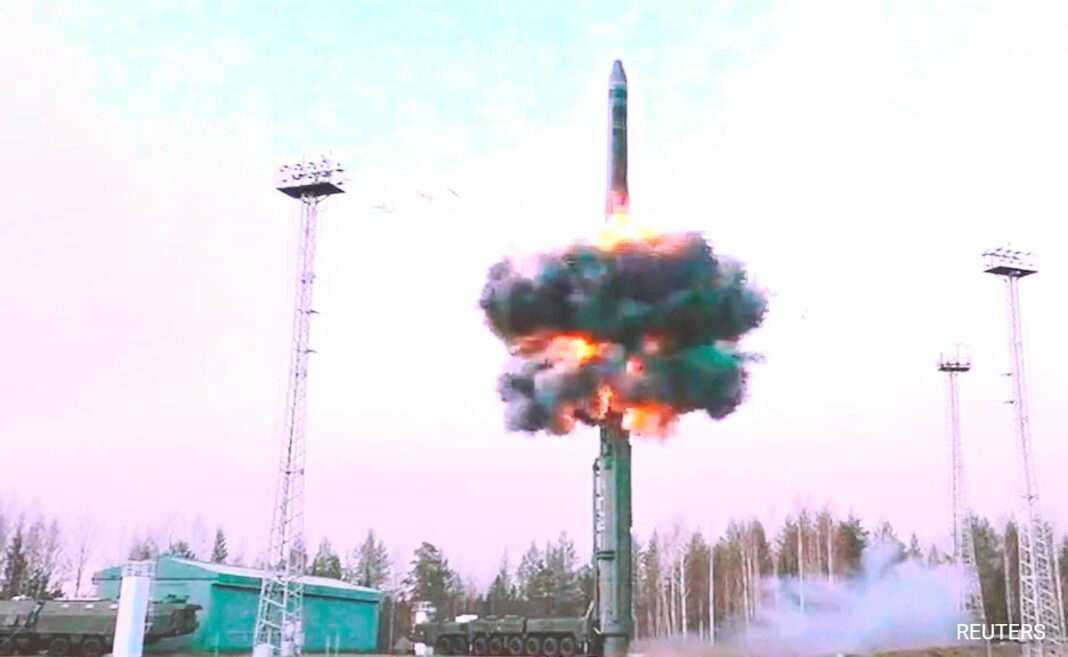[
]

A former officer in Russia’s nuclear forces is among the rare few to speak out about his experiences at one of the country’s most secretive military bases. His testimony to the BBC is about the chilling readiness of Russia’s nuclear arsenal at the start of the full-scale invasion of Ukraine on February 24, 2022.
On that fateful day, Mr Anton was stationed at a nuclear weapons base where his unit was put on full combat alert. “Before that, we had only exercises. But on the day the war started, the weapons were fully in place,” he recalls. “We were ready to launch the forces into the sea and air and, in theory, carry out a nuclear strike.” Russia prepared for the worst.
Mr Anton served as an officer at a highly secretive nuclear weapons facility, an environment with limited insight into its operations. Documents provided to the BBC confirmed his rank, unit, and base. Three days after Russia’s invasion of Ukraine, President Vladimir Putin announced that the country’s nuclear forces were placed on high alert. Mr Anton confirmed that the alert was in place from day one, and he and his colleagues were confined to the base, with access only to Russian state TV. They were not involved in combat but were tasked with guarding the nuclear weapons. The heightened alert status lasted two to three weeks before it was finally lifted.
Mr Anton gave a rare glimpse into the inner workings of Russia’s nuclear forces. All personnel are professional soldiers, with no conscripts, and undergo regular checks and lie-detector tests. The pay is significantly higher, and the troops are not sent to war. Instead, their role is to either defend or execute a nuclear strike.
Life on the nuclear base was strictly controlled, with no personal phones allowed and visitors requiring approval from the FSB months in advance. Mr Anton worked in the security unit, part of a rapid-response force with a two-minute reaction time.
Things took a turn when he was given an order he couldn’t follow. He was told to teach his troops that Ukrainian civilians should be treated as combatants and destroyed. Anton refused, calling it a war crime and rejecting the “propaganda.”
His refusal led to severe consequences. He was reprimanded by senior officers and transferred to a regular assault brigade, units often sent into battle as the “first wave.” Mr Anton, in an act of defiance, signed a statement refusing to participate in the war, resulting in a criminal case opened against him. “I showed them documents confirming my transfer to the assault brigade and details of the criminal case,” Mr Anton explained.
Before being sent to the front lines, Mr Anton decided to flee Russia with the help of a volunteer organisation that helps deserters. He explained if he had tried to escape from the nuclear forces base, the FSB Security Service would have responded swiftly, making it nearly impossible for him to leave the country. However, since he had been transferred to a regular assault brigade, the high-level security clearance was no longer in effect, allowing him to escape.
After escaping, Mr Anton joined the volunteer group “Idite Lesom” (meaning “Go by the Forest” or “Get Lost”), which helps deserters evade the Russian authorities. The group reports that the number of deserters seeking help has risen to 350 a month, with the risks for those fleeing escalating. Mr Anton is acutely aware of the dangers he faces, both in his past role and in his current actions. “I understand the more I do that, the higher the chances they could try and kill me.”
He said that he no longer speaks to his former colleagues at the nuclear base to protect them from the repercussions of their contact with him. “They must take lie-detector tests, and any contact with me could lead to a criminal case.”
Although he has left Russia, Mr Anton remains under threat. The Russian security services continue to look for him, and he now lives in hiding, taking extreme precautions to avoid detection. “I work off the books and I don’t show up in any official systems,” he reveals.


